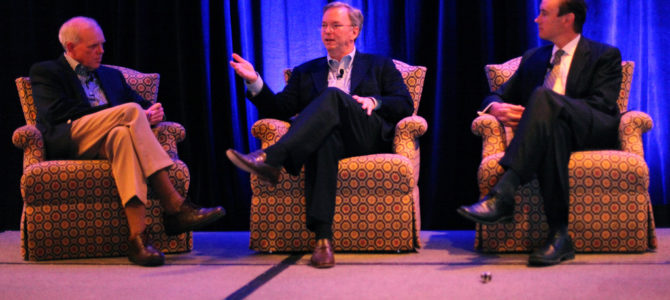
What is actually happening in tech right now? Accounts vary. According to The New York Times, “the alt-right” has found “a new enemy in Silicon Valley.” From a different standpoint, however, the reverse seems closer to the truth.
But the mania around the recent firing of an elite tech employee on “anti-diversity” grounds suggests that presenting the conflict as Tech vs. Pepe obscures far more than it reveals. American Enterprise Institute scholar Christina Hoff Sommers provocatively cast the reverberating ordeal in terms that will be familiar to my readers. “Google,” she told the Heritage Foundation’s Daily Signal, “excommunicated James Damore for crimes against the Pink Police State.” What would it mean for this to be true?
A good place to go in search of an answer is the structure of today’s economy. Responding to journalists’ “1st-Amendment hot takes on the Google memo,” novelist Jake Bacharach tweeted dryly: “Y’all really need to get real jobs and learn about Human Resources.” Rather than a smug ideological attack on freethinkers or alt-righters or whomever, this rejoinder ought to be read as a plain reflection of fact about the way work has been institutionalized in our time.
Diversity and Inclusion Are Sociological Practices
As I have been cautioning since 2009, “the utter dominance of Human Resources departments over the businesses and industries that host them” is the defining feature of the workplace today—especially the “knowledge work” that exerts such dominance over our economy, and, within the realm of knowledge work, especially the elite sector of monopolistic technology corporations that includes Google, Facebook, Apple, and Amazon.
Lost in the unfolding culture war over how much “science” is on the side of diversity and inclusion is the simple point that the logic of human resources control is objectively a central, even founding feature of economic life—no less than the place of “compliance” in the financial services and related industries, which has come to supersede the practice of capitalism.
Although as far as ideal types go, the Pink Police State is provocative by design, I have taken care to emphasize that its power is analytical first and ideological a trailing second. “The 1st Amendment,” as I noted in 2014’s Pink Police State series, is “blind to the state’s current interest in establishing a secular, not religious, creed. This is key to understanding the absolute importance of ‘diversity and inclusion.’ These foundational ideas are not best seen as ‘ideological values.’ They are sociological practices essential to the functioning of the new regime.”
That regime, in turn, arose less from the machinations of a revolutionary vanguard than from the breakdown of the socioeconomic structures that defined the workplace from the New Deal through the postwar era. It all came to a head during 1999’s Battle in Seattle, when the architects of the global liberal order realized that the truly existentially threatening ideology to arise after the Cold War was internal, not external, to that order.
The rise of the Pink Police State, I concluded, is “a so-far successful attempt to use the kinetic energy of spreading, deepening equality to therapeutically resolve the geopolitical anxiety of the elite on the one hand and the deep disenchantment of the people on the other. It is the rise of a somewhat forcibly negotiated settlement between the imperatives of the contending forces whose war was announced at the Battle of Seattle—the elite technocratic order and its popular erotocratic opposition.” Today’s economic structure is the fruit of that uneasy peace.
This Brings Us to James Damore
This is why the swiftness of Damore’s firing and the shock waves it continues to spread are so noteworthy. Google’s all-hands meeting designed to put a stop to the turmoil was cancelled at the last minute out of fear of leaks.
Google CEO: some of you are worried that you cannot speak out at work freely. pic.twitter.com/T8FSvwRHf4
— Scott McGrew (@ScottMcGrew) August 11, 2017
This strongly suggests that not just the gentler enforcement mechanisms of the current regime, but in fact the structure of the regime itself, is breaking down, in a way that could accelerate dramatically or hit a sudden tipping point. For if not even the most prestigious and powerful instantiation of the knowledge workplace can operate any longer without disruptive challenges to its foundational ideas, what does that say about the weakness of the subaltern parts of our socioeconomic superstructure?
The deepest lesson to be learned from the Damore affair goes well beyond considerations of class or gender, whether from a “social-justice” standpoint or an “alt-right” one. As Bacharach’s quip intimated, today, if you are an employee, you are, as a matter of institutional economic design, not free. The structure of employment in the global liberal order is predicated on not merely an absence of freedom but on an affirmative servitude, a slavery of conscience that can always reach to the deepest levels of moral principle.
Neoliberals and progressives will insist that tremendous social and economic gains have resulted on net from this arrangement—and they will be right! Demonstrably so! In large part for this reason, younger people have gravitated away from self-employment and entrepreneurialism, flowing like lemmings or pilgrims toward the absolute “top tier” of metropolises, there to pledge fealty to those who exact conscience compliance from their human resources in the production of goods and services capable of forestalling anti-“capitalist” revolution.
But some younger Americans—and not just Americans—know well the freedom of conscience and thought that employment negates today, and their counter-Pink Police State worldview is developing around patterns of thinking deeper and more sophisticated than the kinds of resentful nostrums that are so often attributed to the alt-right. Some of those inside the emerald cities of Silicon Valley, who still intuit the freedom they have sacrificed, have been watching and waiting to see how the Damore affair plays out. Some are beginning to look for the exits. Others are reaching for pitchforks.
Employment, it is safe to say, will never die. But its current animating spirit may not be long for this world. Place your bets: Will the Pink Police State live to celebrate its twentieth birthday?









